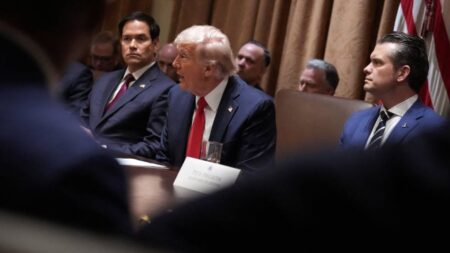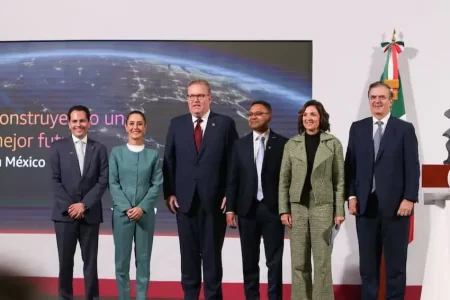Trump Sets Date for Mexico and Canada Tariffs: Effective April 2
U.S. President Donald Trump said in his first cabinet meeting on Wednesday that he will not stop tariffs on products from Canada and Mexico, and added that not all of them will be imposed, but many will be.
The Republican president specified that the tariffs on his trade partners in the T-MEC will be applied on April 2.
“On April 2,” Trump replied to the question of when the customs tariffs will be applied after he gave Canada and Mexico a month’s deadline in early February to find an agreement.
“I’m not going to stop tariffs, no. Millions of people have died from fentanyl coming across the border,” he added during his first cabinet meeting.
Earlier this month, the Trump administration had set March 4 as the effective date for the 25% tariffs on goods from Mexico and non-energy goods from Canada.
Trump’s statement was made in the framework of his first meeting of the Executive, hours before Mexico’s security cabinet meets on Thursday in Washington with the head of US diplomacy, Marco Rubio. The meeting is precisely to try to avoid the tariffs that, in the absence of an agreement, should theoretically come into force next Tuesday.
The Republican acknowledged Wednesday that the number of illegal migrant crossings across the border with Mexico fell drastically but attributed it to his policies.
The data “have been good, but that is also due to us. In large part, to us. Right now it’s very difficult to get across the border,” Trump said.
The fentanyl “is mainly coming from China,” already subject to tariffs, “but it’s coming through Mexico and Canada,” Trump said.
Progress against drug trafficking and migration would be postponed again: Lutnick
The U.S. Secretary of Commerce, Howard Lutnick, assured that the Trump Administration could again postpone the 25% tariffs that the President announced for Canada and Mexico if both neighbors demonstrate progress in the fight against fentanyl trafficking and border security.
Lutnick noted during a U.S. cabinet meeting that Mexico and Canada could avoid imposing tariffs for another season “if they can demonstrate to the president that they’ve done an excellent job,” to which Trump apostilled that it will be difficult to satisfy.
Indeed, although Secretary Lutnick hinted at a possible further delay in the imposition of tariffs, Trump stressed that he is not backing down on the measure, and that he remains committed to imposing these measures, justifying them as a response to fentanyl deaths.
25% tariffs on the European Union on “Fools Day”.
On the other hand, Trump assured that his government will also impose a 25% tariff on the European Union “in general terms” and that it will affect “cars and the rest of things”. “We will announce it very soon,” he said, who already advanced these measures in the middle of the month.
On the EU bloc, Trump has denounced that the European Union was created “to screw the United States.” “That is its purpose,” he stressed.
Questioned about the date on which the new economic measures on Mexico, Canada and the European Union would take effect, Trump pointed to April 2, although he said he would like it to be a day earlier but that he is “a little superstitious.” In Anglo-Saxon culture, April 1 is celebrated as April Fools’ Day.

Source: El Economista





